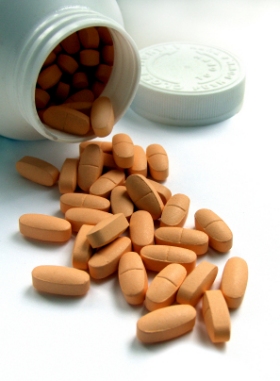01dragonslayer
Ripped
- Jacked Cash
- 537,260
Aside from whey protein, creatine is probably the most-used muscle building supplement in gyms all over the world. Yet, creatine is surrounded by myths and rumors spread by people in gyms, magazines and on the internet who really do not understand what creatine is and how it works. It’s these rumors that either stop people from taking it or teaches them to use it incorrectly.
The other way we get creatine is through our diet, or dietary supplements. Foods that are high creatine include red meat and fish.
This is where creatine kicks in. When you deplete your ATP stores you're left with ADP, which is basically useless for exercise. Now, the creatine which is converted into Creatine Phosphate reacts with the ADP to turn it into ATP. So creatine takes an essentially useless chemical and converts it into usable energy (ATP). Your body can continue to do this until your creatine stores are depleted. This is why it's best to take creatine supplements before your workout, but we get into that later.
Point number 3: increased cell volume. Put simply, creatine increases the amount of water in your muscles. Sometimes when a bodybuilder takes creatine for the first time they will put on a few pounds within a week or two. This is known as "water weight". Water weight can make your muscles appear larger. When a user stops taking creatine it’s not uncommon to drop a few pounds.
 Huge Range of Creatine Products - Cheapest On The Web! Click Here
Huge Range of Creatine Products - Cheapest On The Web! Click Here
Traditionally, most people take creatine after their workouts and at 1-3 other times throughout the day. This is what is also recommended if you read the label of most packaging. There are 2 theories when it comes to when you should take creatine.
Theory 1: You should take creatine about 1 hour before your workout for maximum benefits. I agree with this theory. When you take creatine it stays in your blood stream for about 1.5 hours. So, when you workout you want to have the maximum amount of creatine available for your muscles to use. Taking creatine 1 hour before your workout gives your body time to absorb the creatine and 1.5 hours for you to use it.
Theory 2: Once creatine is absorbed into your muscle cells it can stay there for long periods of time. This means, it doesn’t really matter when you take the creatine as long as your muscle cells are full when you workout. The problem I see with this theory is that yes, your muscles have optimum creatine levels, but where is the extra creatine going to come from to replace the creatine used during an intense workout?
I have yet to come across a scientific study that compared these 2 theories.
Common creatine myths:
- Creatine stunts your growth
- Creatine is a form of anabolic steroid
- Creatine is illegal
- Creatine makes you fat
- If you stop taking creatine you get withdrawal symptoms
- The more creatine you take the more you’ll grow
What is creatine?
Creatine is a substance made by the body and used to store energy. The chemical name for Creatine is methyl guanidine-acetic acid. Creatine is made up of three amino acids - Arginine, Glycine and Methionine. Our liver has the ability to combine these three amino acids and make creatine.The other way we get creatine is through our diet, or dietary supplements. Foods that are high creatine include red meat and fish.
What does creatine do?
I could write a whole article about what creatine does so I’ll keep this short and to the point. Creatine has 4 basic roles.- Provides energy to your muscles
- Enhances protein synthesis
- Increases cell volume
- Lactic acid buffer
This is where creatine kicks in. When you deplete your ATP stores you're left with ADP, which is basically useless for exercise. Now, the creatine which is converted into Creatine Phosphate reacts with the ADP to turn it into ATP. So creatine takes an essentially useless chemical and converts it into usable energy (ATP). Your body can continue to do this until your creatine stores are depleted. This is why it's best to take creatine supplements before your workout, but we get into that later.
Point number 3: increased cell volume. Put simply, creatine increases the amount of water in your muscles. Sometimes when a bodybuilder takes creatine for the first time they will put on a few pounds within a week or two. This is known as "water weight". Water weight can make your muscles appear larger. When a user stops taking creatine it’s not uncommon to drop a few pounds.
How much creatine is in our body and where is it stored?
The amount of creatine you have in your body depends on your lean muscle mass and bodyweight. The average 200 pound man has approximately 150 grams of creatine in their body. Around 95-98% of creatine is stored in muscle tissue with the remainder stored in other body parts like the brain.Is creatine a type of steroid and is it dangerous?
First of all, creatine is naturally occurring and produced by the body. This makes it a very safe supplement. If your body has too much creatine that it doesn’t need it will simply convert it to creatinine and excrete it. That being said, there is such thing as “too much of a good thing is bad for you”. Taking too much creatine may place excess stress on the liver which could lead to problems after extended use. When it comes to creatine you have to adopt the “less is more” mentality. You will be wasting your money if you take too much creatine, your body can only take and use so much before it is excreted. And no, creatine is definitely not a type of steroid!When is the best time to take creatine?
 Huge Range of Creatine Products - Cheapest On The Web! Click Here
Huge Range of Creatine Products - Cheapest On The Web! Click HereTraditionally, most people take creatine after their workouts and at 1-3 other times throughout the day. This is what is also recommended if you read the label of most packaging. There are 2 theories when it comes to when you should take creatine.
Theory 1: You should take creatine about 1 hour before your workout for maximum benefits. I agree with this theory. When you take creatine it stays in your blood stream for about 1.5 hours. So, when you workout you want to have the maximum amount of creatine available for your muscles to use. Taking creatine 1 hour before your workout gives your body time to absorb the creatine and 1.5 hours for you to use it.
Theory 2: Once creatine is absorbed into your muscle cells it can stay there for long periods of time. This means, it doesn’t really matter when you take the creatine as long as your muscle cells are full when you workout. The problem I see with this theory is that yes, your muscles have optimum creatine levels, but where is the extra creatine going to come from to replace the creatine used during an intense workout?
I have yet to come across a scientific study that compared these 2 theories.









